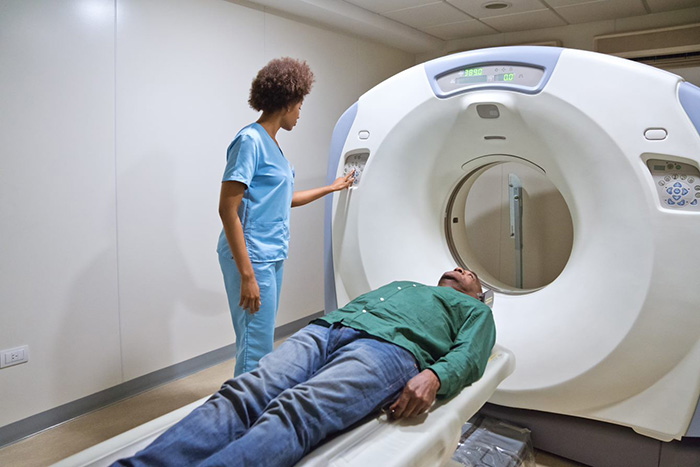Office of Research & Development |
 |


U.S. Preventive Services Task Force guidelines recommend lung cancer screening for people who are 50 to 80 years old, have a 20 pack-year smoking history, and are current or former smokers. (Photo for illustrative purposes only: © Getty Images/izusek)
April 22, 2022
By Tristan Horrom
VA Research Communications
Black Veterans with lung cancer receive comparable care, with equivalent, if not superior, treatment outcomes as white Veterans at VA, according to a study by VA St. Louis researchers.
Black Veterans with lung cancer receive comparable care, with equivalent, if not superior, treatment outcomes as white Veterans at VA, according to a study by VA St. Louis researchers. VA cancer care appears to be more equitable than care received in the private sector, where significant racial disparities exist.
First study author Dr. Brendan Heiden, of the Washington University School of Medicine in St. Louis, explains how the findings show the strength of the VA health care system. “This study highlights the exceptional care that Veterans receive through VA hospitals, including for highly complex diseases like lung cancer,” he says. “The VA system also appears to mitigate racial and other disparities in care. Harnessing lessons from the VA may help to address lung cancer disparities in the general U.S. population.”

VA researchers using AI to decide best treatment for rectal cancer

VA center training the next generation of researchers in blood clots and inflammation

AI to Maximize Treatment for Veterans with Head and Neck Cancer

VA investigator brings diversity into autoimmune disease research
The study appeared online in the April 8, 2022, issue of the journal Chest.
Non-small cell lung cancer, the most common form of lung cancer, is the leading cause of cancer-related death in the United States. Surgery is the gold standard treatment for early-stage lung cancer.
Previous research in the general population has shown that Black patients are less likely than white patients to undergo surgery for lung cancer. Some studies have also shown that Black patients are less likely to receive high quality surgical procedures. Even when Black patients do receive surgery, they tend not to live as long as white patients after treatment.
Multiple factors contribute to these disparities. Black patients are more likely than white patients to face inadequate insurance coverage and less access to care. They are also more likely to come up against provider bias and discrimination, poorer communication, and patient distrust of physicians stemming from cultural factors.
But many of these disparities are addressed in the VA system. VA is an equitable health insurance system. All Veterans receiving care through VA should have equal access to all types of care with little to no cost to the patient. VA also provides services like transportation, housing and employment assistance, and mental health care. These services help address the social determinants of health that often lead to unequal care based on race.
To analyze the quality of cancer care Black Veterans received in VA, the researchers looked at data from 18,800 patients with early-stage non-small cell lung cancer. Of these, 57% of Black and 58% of white patients had surgery. Of the nearly 10,000 surgery patients, 85% of these patients were white, and 15% were Black.
Black Veterans were less likely to experience major post-operative complications, the researchers found. There was no difference between the groups in 30-day readmissions to the hospital and 30-day mortality rates (death following discharge from the hospital, within 30 days).
Patients were followed for about six years after surgery. After adjusting for other risk factors, Black Veterans were found to live significantly longer than white Veterans during this time period. To the best of the researchers’ knowledge, this is the first study to show better survival rates in Black compared with white Veterans with lung cancer.
The study also assessed the quality of procedures patients received. Both patient groups had similar numbers in surgery type, amount of cancer cells at the edge of the surgical area, and upstaging to a more advanced form of cancer.
Black patients were slightly less likely to undergo appropriate lymph node sampling. In lymph node sampling, tissue samples are taken from several locations in the lymphatic system—part of the body’s immune system—to check for cancer cells. Lymph node sampling is considered a metric of high-quality surgical treatment. In VA, 30% of Black patients and 34% of white patients received ideal lymph node sampling.
The findings were encouraging and show that VA has addressed many of the problems that lead to racial health care disparities in the private sector, according to the researchers. “We were excited to find that Black Veterans received high-quality care in VA, which was similar, if not superior, to the care received by white Veterans,” explains Heiden.
On the logistical side, Black patients had slightly longer wait times between diagnosis and surgery. Black patients waited about 10 weeks on average, one week longer than white patients. However, prior research has shown that wait times as long as 12 weeks are not linked to worse outcomes, implying that the “vast majority” of Veterans receive timely surgery regardless of race.
Black and white patients had similar lengths of hospital stay. However, Black patients were less likely to experience prolonged lengths of stay.
The results of this study suggest that VA’s universal health system and its efforts to address social determinants of health are making a difference, according to the researchers. While more work is needed to close the gap in lymph node sampling, Black Veterans receiving lung cancer surgery in VA do not face the same disparities seen in the general population. Lessons from VA could help improve cancer care for the rest of the country, note the researchers. “Harnessing strategies from the [Veterans Health Administration] may help mitigate racial disparities in lung cancer care in the U.S.”
VA Research Currents archives || Sign up for VA Research updates